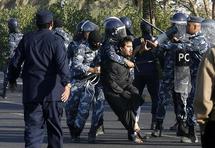
"Stateless since 50 years, we demand citizenship," read a huge banner in English as protesters chanted "we will not leave without a solution."
There were other protests in Sulaibiya, southwest of Kuwait City, and in the oil-rich city of Al-Ahmadi, south of the capital.
Stateless Arabs, known locally as bidoons and estimated at more than 100,000, protested last month for three consecutive days until officials gave them assurances that their grievances would be addressed.
But parliament on Tuesday refused to debate a draft bill that would give them civil rights.
Stateless Arabs claim entitlement to Kuwaiti citizenship, but the government calls them "illegal residents" and bars them from work.
Kuwait launched a crackdown on the bidoons in 2000, depriving them of basic rights including the right to health, education and jobs, in a bid to force them to reveal what the authorities say are their true identities.
Many bidoons have no right to a driving licence, cannot get birth certificates for their babies or death certificates for the dead. They are also banned from getting their marriage contracts attested.
Because of stringent government restrictions, a majority of them are living in dire economic conditions in oil-rich Kuwait, where the average monthly salary of native citizens is more than $3,500 (2,575 euros).
--------------------------------------------------------------------------------
There were other protests in Sulaibiya, southwest of Kuwait City, and in the oil-rich city of Al-Ahmadi, south of the capital.
Stateless Arabs, known locally as bidoons and estimated at more than 100,000, protested last month for three consecutive days until officials gave them assurances that their grievances would be addressed.
But parliament on Tuesday refused to debate a draft bill that would give them civil rights.
Stateless Arabs claim entitlement to Kuwaiti citizenship, but the government calls them "illegal residents" and bars them from work.
Kuwait launched a crackdown on the bidoons in 2000, depriving them of basic rights including the right to health, education and jobs, in a bid to force them to reveal what the authorities say are their true identities.
Many bidoons have no right to a driving licence, cannot get birth certificates for their babies or death certificates for the dead. They are also banned from getting their marriage contracts attested.
Because of stringent government restrictions, a majority of them are living in dire economic conditions in oil-rich Kuwait, where the average monthly salary of native citizens is more than $3,500 (2,575 euros).
--------------------------------------------------------------------------------









 Home
Home Politics
Politics









